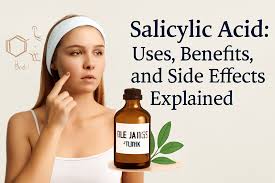
.webp)
.webp)
.webp)
Does Salicylic Acid Help Psoriasis? Understanding Its Benefits and Limitations
.webp)
.webp)
Psoriasis is a complex and challenging skin condition, often misunderstood due to its unclear origins.
.webp)
.webp)
.webp)
While much is still unknown about its precise causes, one skincare ingredient has earned a solid reputation for alleviating some of the symptoms: salicylic acid.
.webp)
.webp)
In this article, we’ll explore how salicylic acid works to manage psoriasis and how it can help soothe your skin without worsening the condition.
.webp)
.webp)
.webp)
Before diving into how salicylic acid interacts with psoriasis, let’s first review the basic facts about the condition itself and the powerful properties of this acid.
.webp)
.webp)
What is Psoriasis?
.webp)
.webp)
.webp)
Psoriasis is a chronic autoimmune skin disorder, though its exact cause remains unclear. It’s linked to an overactive immune system that accelerates skin cell turnover.
.webp)
.webp)
This rapid skin regeneration means new skin cells don’t shed quickly enough, and as a result, they accumulate on the skin’s surface.
.webp)
.webp)
.webp)
Over time, this build-up leads to the formation of thick, raised patches, or plaques, which can be flaky, itchy, and sometimes painful.
.webp)
.webp)
These plaques typically appear on the scalp, elbows, knees, lower back, and even the face. They’re often accompanied by inflammation, redness, and itching.
.webp)
.webp)
.webp)
The severity of psoriasis can vary, but it is a lifelong condition that comes in cycles of flare-ups and periods of remission.
.webp)
.webp)
Those living with psoriasis often report burning, stinging, or intense itching sensations, making the condition even more uncomfortable.
.webp)
.webp)
.webp)
Psoriasis can also extend beyond the skin, affecting the joints (psoriatic arthritis) and leading to additional health complications, including an increased risk of cardiovascular diseases.
.webp)
.webp)
As you can imagine, managing psoriasis is not only about addressing visible symptoms, but also preventing systemic issues that may affect your overall well-being.
.webp)
.webp)
.webp)
What is Salicylic Acid?
.webp)
.webp)
Salicylic acid is a beta-hydroxy acid (BHA) renowned for its ability to exfoliate the skin. Derived from willow bark, it is oil-soluble, meaning it can penetrate deep into the skin’s layers.
.webp)
.webp)
.webp)
This ability makes salicylic acid particularly effective at breaking down dead skin cells and unclogging pores, offering a dual-action benefit: exfoliating the skin’s surface and cleaning out blocked pores.
.webp)
.webp)
In addition to treating acne, blackheads, and other blemishes, salicylic acid is used in various skincare formulations to improve the overall texture and appearance of the skin.
.webp)
.webp)
.webp)
It helps with removing dead skin cells, dirt, and excess oil while preventing clogged pores.
.webp)
.webp)
This makes salicylic acid effective for issues like hyperpigmentation, uneven skin tone, and signs of premature aging, such as fine lines and wrinkles.
.webp)
.webp)
.webp)
Salicylic acid’s exfoliating power also makes it a key ingredient in many skincare products targeting scalp issues.
.webp)
.webp)
It helps remove the build-up of dead skin cells on the scalp, clearing the way for healthier hair growth. But can it also help with psoriasis?
.webp)
.webp)
.webp)
Does Salicylic Acid Help Psoriasis?
.webp)
.webp)
Yes, salicylic acid can be helpful in managing psoriasis.
.webp)
.webp)
.webp)
Its primary benefit for psoriasis sufferers is its ability to exfoliate the skin, which helps eliminate the thick, scaly patches of skin caused by psoriasis.
.webp)
.webp)
These plaques are essentially dead skin cells that have built up because the body’s skin regeneration process is sped up, and they don’t shed as they should.
.webp)
.webp)
.webp)
By removing these dead skin cells, salicylic acid softens the plaques, making the skin feel smoother and more comfortable.
.webp)
.webp)
The result is a reduction in the size and severity of psoriasis flare-ups, leaving the skin feeling less inflamed and irritated.
.webp)
.webp)
.webp)
For many individuals, salicylic acid’s exfoliating action brings much-needed relief from the discomfort of psoriasis.
.webp)
.webp)
It not only helps reduce the visibility of the plaques but also soothes the skin, making it feel more manageable.
.webp)
.webp)
.webp)
Considerations: How Strong Should the Salicylic Acid Be?
.webp)
.webp)
While salicylic acid can be a powerful ally in the treatment of psoriasis, it’s important to note that the strength of salicylic acid used can significantly impact the outcome.
.webp)
.webp)
.webp)
Higher concentrations of salicylic acid (greater than 2%) can irritate the skin, especially for individuals with sensitive skin.
.webp)
.webp)
Overuse or improper application could even cause the skin to dry out, leading to more irritation and further inflammation.
.webp)
.webp)
.webp)
For psoriasis sufferers, this is especially critical when the acid is applied to sensitive areas like the scalp.
.webp)
.webp)
High-potency salicylic acid products might cause hair to become weak and brittle, leading to temporary hair loss.
.webp)
.webp)
Though this is generally a short-term side effect, it’s crucial to consult a dermatologist before incorporating such products into your routine to avoid these unwanted consequences.
Can Salicylic Acid Make Psoriasis Worse?
While salicylic acid can be beneficial for many, improper use can aggravate the condition. For example, using salicylic acid as a long-term solution for psoriasis is not recommended.
Prolonged use could lead to increased skin dryness or sensitivity, worsening the inflammation and discomfort associated with psoriasis.
In addition, high concentrations of salicylic acid could cause an unwanted reaction, leading to redness, irritation, or even chemical burns in severe cases.
For this reason, salicylic acid should only be used as part of a treatment plan and not as the sole treatment for psoriasis.
It’s best utilized to tackle flare-ups and re-balance the skin’s surface, but a long-term solution requires a comprehensive approach, typically under the guidance of a dermatologist.
What’s the Best Acid for Psoriasis?
Despite its potential downsides, salicylic acid remains one of the best acids for treating psoriasis.
It has proven efficacy in softening and breaking down the thick plaques of dead skin that are characteristic of psoriasis. However, as mentioned earlier, it should be used with caution.
For prolonged relief, it’s often recommended to pair salicylic acid with other hydrating ingredients.
Adding products with hyaluronic acid or niacinamide to your skincare routine can help counterbalance the dryness and irritation that might result from using salicylic acid.
These ingredients provide additional moisture and help maintain the integrity of the skin’s barrier, ensuring that the treatment does not cause excessive dryness.
Is Salicylic Acid Good for Scalp Psoriasis?
Salicylic acid is also commonly used to treat scalp psoriasis. Scalp psoriasis often results in a build-up of dead skin cells, leading to scales and flakes that can be both unsightly and irritating.
Salicylic acid shampoos and topical treatments are designed to exfoliate the scalp, removing these flakes and easing the discomfort caused by inflammation.
However, scalp psoriasis can be tricky, as the skin on the scalp is sensitive. If the salicylic acid concentration is too strong, it could make the hair weak, causing breakage or even temporary hair loss.
Therefore, it’s vital to choose a milder formulation when treating scalp psoriasis and consult with a dermatologist to determine the right concentration for your needs.
Can Psoriasis Go Away?
Unfortunately, psoriasis cannot be permanently cured. It’s a chronic condition that tends to go through cycles of flare-ups and periods of remission.
While treatment can significantly reduce the severity of symptoms and keep the condition under control, psoriasis will likely return at some point.
However, many people experience periods of remission where their psoriasis improves or even seems to disappear.
Factors like stress management, immune system functioning, and avoiding known triggers can all influence these periods of remission.
For some, psoriasis may worsen in the winter months when the cold air and dry conditions can exacerbate flare-ups.
How to Prevent Psoriasis from Spreading
While psoriasis is incurable, there are ways to manage flare-ups and prevent the condition from spreading or worsening. Here are a few strategies that can help:
Hydrate Your Skin Regularly: Use moisturizers containing hyaluronic acid, vitamin E, or niacinamide to keep the skin hydrated.
Applying petroleum jelly at night can help lock in moisture and keep your skin comfortable.
Avoid Cold, Dry Environments: Cold weather can aggravate psoriasis, so maintaining a moisturizing routine and using a humidifier can help protect the skin during winter months.
Live a Healthy Lifestyle: Regular exercise, a balanced diet, and limited alcohol intake can help reduce the likelihood of flare-ups and keep your skin healthier overall.
Manage Stress: Stress is a known trigger for psoriasis flare-ups. Incorporating stress-relieving activities like yoga, meditation, or even simple walks can help reduce the frequency and intensity of flare-ups.
Conclusion: Can Salicylic Acid Help with Psoriasis?
In summary, salicylic acid is a beneficial treatment for managing psoriasis flare-ups, particularly for removing the thick plaques of dead skin that form on the skin’s surface.
It can provide relief by exfoliating the skin and softening the rough patches associated with psoriasis.
However, it’s essential to use it with caution, as high concentrations or prolonged use could irritate the skin or cause side effects.
For the best results, it’s recommended to consult a dermatologist to develop a treatment plan tailored to your specific needs.
By incorporating salicylic acid alongside other hydrating and calming ingredients, you can effectively manage psoriasis flare-ups and maintain smoother, healthier skin.



